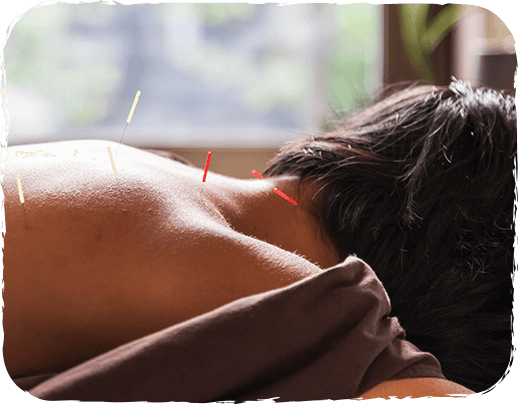What is Acupuncture?
Acupuncture is about 10,000 years old as shown by archaeological evidence. Luckily we've benefited a lot from the experience of a lot of health care practitioners down through the ages, as well as technological advances in materials and other areas. In Oriental Medicine, we don't throw techniques and knowledge out because it's old. At the same time we don't ignore new information and research in the medical world. Acupuncture originated in China, but now is being practiced and researched all over the world. There are many different styles and techniques under the acupuncture umbrella, ranging from non-invasive techniques like laser acupuncture to what looks to the average Western onlooker like minor surgery.

How It Works
The acupuncture needle insertion is usually very light, partly because the needles are very small. You can fit 15 or so of them into the tip of a hypodermic needle tip-first. There's also a guide tube that the needle goes into first, which helps get the needle in faster, and thus less painfully. If it hurts (which is rare), you can just tell us and we'll take the needle back out again or at least adjust it. After the needles are inserted (or not, in the case of laser acupuncture), you'll just hang out on the massage table for up to 30 minutes or so with a table warmer underneath you, a far infrared TDP heat lamp shining down onto you, and some music playing. We take requests. You take some much-needed time for yourself. Most people fall asleep, but some people meditate (we can teach you), play games, or read a book or magazine. We have armrests, but no cupholder.
As for how it actually works, there are a few things that are pretty well understood. Any injury, including that caused by a tiny needle, causes our bodies to release pain fighting chemicals called endogenous opioids. This translates to pain fighting chemicals from inside, as opposed to pain pills and other types of external pain drugs/herbs. Along with this release of pain chemicals, our bodies release endorphins and other chemicals that cause some people to feel euphoric, but nearly everyone to feel very relaxed after a treatment. It's like a reset button for our nervous system, switching us from sympathetic to parasympathetic modes of operation. In other words, it's great for stress because it changes us from fight or flight mode to rest and digest mode. Some of these chemicals the body releases also cause muscle tension reduction, as well as decreases in inflammation in our bodies so that we can heal faster. Stress is inflammatory, so this is a double whammy of anti-inflammatory action. Pain itself is stressful, so if you're in less pain, would that then become a triple whammy? Since it commonly puts people to sleep, and sleep is when our bodies heal best, that might make a quadruple whammy, if you'll pardon the expression. Plus if you're digesting food better due to having less stress, that means you're getting more nutrients, healing faster, and that might be a...never mind, you get the point. This is a pretty simplified version of how acupuncture works, and far from complete. We love talking about it though, so just ask us!
Benefits of Acupuncture
Most people like acupuncture and we find that it helps with all kinds of health concerns. Thanks to science, we have a lot of evidence to this effect as well.
Since acupuncture helps with pain, muscle tension, and inflammation, insurance commonly covers low back pain, neck pain, and headaches, to name a few. Basically any kind of acute or chronic pain is likely to be improved by acupuncture -- either quickly or slowly -- depending on how bad it is and how well your body responds to acupuncture. This includes nerve pain as well, since acupuncture affects the nervous system positively. Things like sciatica, carpal tunnel, and thoracic outlet syndrome are well-suited to acupuncture treatment. Usually, dietary education comes into play here, primarily focused on inflammatory vs anti-inflammatory fat intake.
Patients often also respond well to acupuncture for anxiety and depression. There is mounds of research out there for these problems as well indicating that acupuncture is just as successful as talk therapy or pharmaceuticals for these problems. We also commonly talk about Chinese herbs and/or probiotics as adjunctive care for these conditions.
Hot flashes and night sweats are helped quite a bit by acupuncture and Chinese herbs. Here, the herbs are actually the more important thing to be doing, but acupuncture helps too. The idea is to help your body regulate its hormones to keep you more comfortable.
Allergies are a big one that Oriental Medicine helps with, specifically inhalant allergies like pollen, animal dander, and mold. We have plenty of those things around here, depending on the time of year, and this is another area where herbs and acupuncture work well together.
